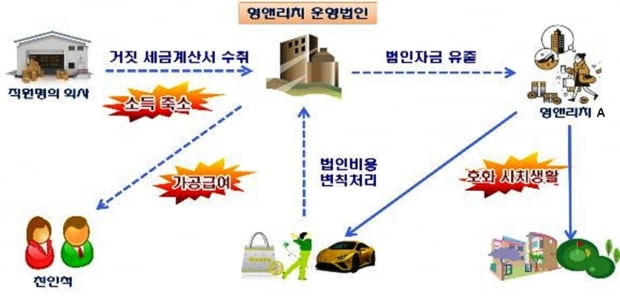National Tax Service investigates 61 suspected tax evasion suspects

In her early 30s, A received 7 billion won of stock from her parents and rose to the post at a young age.
Representative A set up a ghost company in the name of an employee, obtained a tax invoice by paying false advertising expenses, and leaked the money in the company as if he had paid labor expenses to relatives.
With the money stolen in this way, A acquired and lived in Seoul for 7 billion houses, and bought a shopping mall and golf membership.
The money for luxury living, such as rolling two supercars (a total of 900 million won) and buying luxury goods, was handled as company expenses.
The tax authorities recently collected billions of billions of billions, including corporate taxes, by performing a tax investigation after detecting A’s alleged evasion.
The National Tax Service announced on the 17th that it has undertaken a tax investigation on 61 suspected of unfair tax evasion, such as’Young & Rich’, a young property owner who has been dubbed their property through expedient donations of the family members.
The subject of this tax audit is ▲ 38 luxury/luxury people who acquired “little buildings” or residences with hidden income, including young wealthy people ▲ Illegal lenders against self-employed and small business owners, medical devices and health that took profits and reduced income There are 23 people suspected of tax evasion, including food companies and pseudo-investment advisory companies that reduced income by setting up a disguised company.
According to the National Tax Service, the average property value of 16 Young & Rich in their 20s and 30s who were subjected to this tax audit is 18.6 billion won.
The average property value by major asset is KRW 4.2 billion for residence, KRW 13.7 billion for Little Building, and KRW 1.4 billion for membership.
The trend of increasing interest in property prices in residences and small buildings due to the reinforcement of housing transactions and holding taxes was also revealed in this tax audit.
Key owner B, who was selected as the subject of the investigation, was charged with hiding tens of billions of income by using a method of paying fake expenses by setting up a ghost company in the name of a spouse after receiving cash sales in the name of a relative.
B bought three residences (total of 7 billion won) under the corporate name and used it privately with the family, and it was found that a little building worth more than 20 billion won was donated to their children in an expedient way.
The National Tax Service explained, “After a corporation acquires a residence for business, there are cases in which the owner actually uses it for residential use or leases it as a house, and the rental income is omitted.”
The taxation authority also looks at the expedient gift (value-add gift) that parents bear the cost of remodeling after the parents and their children jointly acquire the Little Building.

A tax evasion suspect was also selected as a target for this investigation, arising from anxiety caused by the novel coronavirus infection (Corona 19) and infringement of people’s livelihood due to the heat of the stock market.
C, which runs a similar investment advisory company, recently collected information usage fees by attracting false advertisements and a large number of stock investors as stock experts in an attempt to boom the stock market.
C is accused of evading income by collecting information usage fees through 10 camouflage companies established to hide sales.
The National Tax Service announced that it will comprehensively verify the suspicion of evasion by linking and analyzing a wide range of financial flows of families such as Young & Rich and their parents, the process of property formation and consumption of the family members, and transactions with related companies.
In addition, in the course of the investigation, if the accusation of deliberate tax evasion, such as the use of a borrowed account or the creation of a double ledger, is confirmed, a complaint will be filed under the Tax Offender Penalty Act.
/yunhap news
